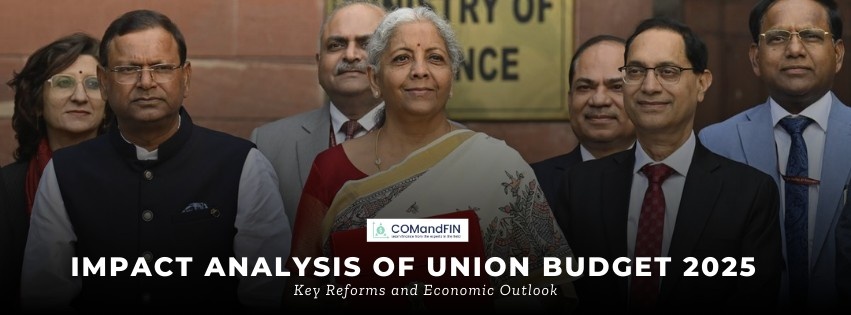
The Union Budget 2025 marks a transformative step towards economic resilience, financial inclusivity, and business simplification. With a strategic focus on tax rationalization, investment boosts, and trade facilitation, the budget aims to stimulate growth, ease compliance, and enhance the overall business environment. Below is an in-depth analysis of its impact across various sectors.
Impact on Taxpayers and Businesses
- New Tax Regime 2025 and Changes in Income Tax Slabs
- Increased Rebate Under Section 87A
- Simplification of TDS/TCS Provisions
- Extended ITR-U Deadline
- Withdrawal from National Savings Scheme (NSS) Becomes Tax-Free
- Implications of Section 80CCD(1B) Expansion
- Omission of Sections 206AB and 206CCA
- Introduction of Section 44BBD for Presumptive Taxation
The revised 2025 income tax slabs under the new tax regime lower tax rates for middle-class taxpayers while reducing exemptions and deductions. This will likely lead to increased compliance and simplify tax filing, benefiting individuals and salaried employees. The move also nudges taxpayers towards the new regime, reducing complexity and broadening the tax base.
With the rebate threshold raised, individuals earning up to a specified limit will effectively pay zero tax. This enhances disposable income, encouraging consumption and savings, particularly for the middle and lower-income groups.
The streamlined Tax Deducted at Source (TDS) and Tax Collected at Source (TCS) norms ease compliance for businesses. Industries such as e-commerce, real estate, and professional services will benefit from reduced documentation and lower rates, reducing operational hurdles.
The extension of the time limit for filing updated returns provides relief to taxpayers by allowing them to rectify past omissions without legal consequences. This move fosters voluntary compliance, reducing litigation risks.
Exempting NSS withdrawals from tax enhances the attractiveness of small savings schemes, encouraging long-term investments and financial security for individuals.
By extending tax benefits to NPS Vatsalya Accounts, the government incentivizes savings for children’s future, promoting financial planning and security.
Removing higher TDS/TCS rates for non-filers simplifies compliance, reducing administrative burdens on businesses and individuals while making transactions smoother.
Small businesses and professionals benefit from the new presumptive taxation scheme, which simplifies tax calculations and reduces record-keeping obligations, fostering ease of business operations.
1.jpeg)
#UnionBudget2025 #EconomicGrowth #TaxReforms #FinanceBudget #future-readyIndia


Impact on Trade and Indirect Taxation
Adjusting customs tariffs corrects duty inversions, benefiting domestic manufacturers by reducing reliance on imports. This measure is crucial in strengthening India’s self-reliance in critical industries like electronics and textiles.
Providing tax relief on life-saving drugs improves healthcare affordability, ensuring that critical treatments remain accessible to patients suffering from chronic and rare diseases.
Customs duty changes on electronic goods and automobile components support local industries, promoting ‘Make in India’ and job creation in manufacturing sectors.
The government’s incentives for handicrafts, leather, marine products, and Maintenance, Repair, and Overhaul (MRO) services enhance India's export competitiveness. Strengthening export credit mechanisms provides a financial cushion to small exporters, ensuring their sustained growth in global markets.
Sector-Wise Economic Impact
Overall Economic Outlook and Future Implications
The Union Budget 2025 strikes a balance between economic stimulus and fiscal prudence. By focusing on tax reforms, trade facilitation, and sectoral investments, it lays the foundation for sustainable growth. The emphasis on compliance simplification, ease of doing business, and technological advancement positions India as a competitive global player.
Key Takeaways for Individuals and Businesses
With a progressive tax environment and structural economic enhancements, Budget 2025 paves the way for a future-ready and self-reliant India. Businesses, investors, and individuals should align their financial strategies to leverage these reforms effectively.